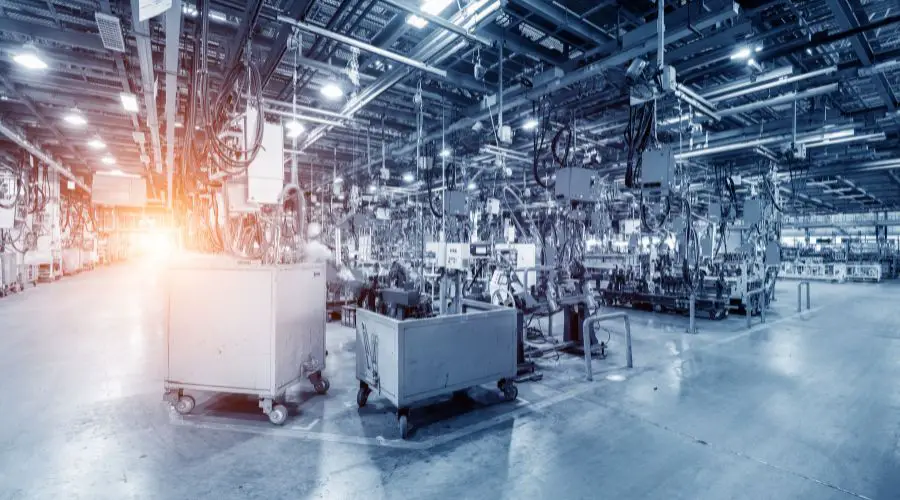In the quest for digital transformation, manufacturing companies, both small and large, grapple with the ERP vs MES dilemma to enhance efficiency and cut costs.
MES shines in real-time shop floor control, ensuring seamless production tracking and quality management. In contrast, ERP excels in holistic resource management, knitting together various departments’ efforts.
The silver lining?
They’re not rivals but collaborators, often integrated to harness each other’s strengths. This synergy fosters smooth intra-organizational communication, delivering a panoramic business view.
By deciphering the unique capabilities of MES and ERP, manufacturers can confidently choose and execute the perfect-fit solution for their tailored needs.
Understanding MES and ERP Systems
Definition of MES
Manufacturing Execution Systems (MES) are computerized systems used in manufacturing processes to track, control, and document the production process. They provide real-time data about the production floor, which enables timely decision-making and leads to increased efficiency and productivity.
MES systems manage various aspects of production, such as job scheduling, resource allocation, materials handling, and performance metrics.
Basically, manufacturers can reap a host of benefits from an MES. For example, implementing an MES at their own plants helped Rockwell Automation:
- Increase on-time delivery by 96%
- Improve product availability by 16%
- Increase annual productivity by 5%
- Reduce defects by 50%
- Reduce lead times by 50%
- Reduce inventory by 32%
Definition of ERP
Enterprise Resource Planning (ERP) systems, n the other hand, are comprehensive business management software solutions that integrate all aspects of a company’s operations.
ERP systems enable organizations to automate, streamline, and track different business processes, such as finance, human resources, procurement, and supply chain management.
Ideally, by having all critical information centralized and accessible, companies can make better-informed decisions and align their resources more effectively.
As you’ll see below, MES and ERP systems are often used together to achieve greater visibility into the manufacturing process and manage resources more efficiently.
But, to recap, while there is some overlap in functionality, they have distinct roles and features.
- MES focuses on the production floor, controlling and monitoring the execution of manufacturing operations.
- ERP covers a broader range of business processes, integrating different aspects of the organization beyond the production environment.
In conclusion, MES and ERP systems, when used in tandem, can help manufacturers optimize their production processes, reduce costs, and make data-driven decisions.
Understanding the differences between these systems and when to deploy them effectively can be crucial to their success.
Key Differences Between MES and ERP
Primary Focus
MES (Manufacturing Execution System) primarily focuses on the production floor and the actual manufacturing processes. It provides real-time, granular data about production activities, equipment, and personnel. This system aims to optimize production efficiency and quality while reducing downtime and waste.
ERP (Enterprise Resource Planning) is a business management software that integrates various organizational functions such as finance, human resources, supply chain, and customer relationship management. Its primary goal is to streamline business processes, improve information flow, and support decision-making at a higher level.
Data Processing
MES deals mainly with real-time data collected directly from machines, sensors, and operators on the shop floor. As it is often integrated with the machines, an MES can process this data to optimize production schedules, track work orders, monitor equipment performance, and ensure product quality.
ERP, on the other hand, is a software platform that processes transactional data from different departments across the organization. It consolidates this data into a centralized system to provide better visibility and analytics for management.
Implementation Costs
The implementation costs of MES and ERP systems can differ significantly based on the scope and complexity of the project. MES systems are typically less expensive than ERP systems, as they focus on a specific area (the production floor) and require fewer integrations with other systems.
ERP systems involve a broader scope, and their implementation can be more expensive and complex. Customization and integration with existing systems can further increase the costs. However, the long-term benefits and efficiencies gained from implementing an ERP system often justify the higher initial investment.
Benefits of MES and ERP Integration
We now know how each of these systems can benefit an organization and how they differ in key areas. But integrating the two models is when manufacturers can truly move towards digital transformation.
Note: Some ERP platforms, like Microsoft’s Dynamics 365 Supply Chain Management software, offer built-in connection capabilities to integrate with manufacturing execution systems. And for a more complex implementation but truly centralized data architecture, some manufacturers choose to integrate the system using an IoT solution.
Improved Data Accuracy
Integrating MES (Manufacturing Execution System) and ERP (Enterprise Resource Planning) systems can greatly improve data accuracy throughout an organization.
Accurate data is essential for monitoring production performance and ensuring timely decision-making. By combining data from both systems, discrepancies are reduced, providing a more reliable foundation for operational and managerial decisions.
With integrated systems, data entry errors and duplication are minimized, as information is available and updated in real-time. This results in a singular data source that all employees can utilize, fostering better communication and reducing confusion.
Streamlined Operations
MES and ERP integration leads to streamlined operations by automating processes and reducing manual intervention.
This synergistic alliance allows for a seamless flow of information between various levels of an organization – from production to management and all the way to the supply chain. Real-time data availability, for instance, accelerates order processing and enhances inventory tracking.
Automating processes also reduces the time taken for tasks, such as data entry, production planning, and resource management. It maximizes efficiency and allows employees to focus on higher-value tasks that contribute to organizational growth and profitability.
Better Decision Making
Finally, integrating cloud based MES and ERP systems can provide valuable insights for better decision-making. Through real-time data analysis, managers can identify patterns, trends, and opportunities for improvements. This helps establish effective strategies for production optimization, quality control, and market competitiveness.
In summary, integrated MES and ERP systems drive better data accuracy, streamline operations, and enable more informed decision-making. These attributes contribute to overall organizational efficiency and success.
Factors to Consider when Choosing Between MES and ERP
Industry Requirements
When deciding between MES and ERP systems, it’s essential to consider the specific needs of your industry. Some industries might require more emphasis on manufacturing processes and real-time control, which is where MES excels. In contrast, others might focus more on resource planning and high-level management, which is better served by ERP systems.
Business Size
Business size plays a crucial role in determining the suitability of either an MES or ERP system. Smaller businesses with fewer production lines might find that an MES is more than adequate for their needs.
On the other hand, larger organizations with complex production schedules and resource requirements may benefit more from the comprehensive approach of an ERP system.
Scalability
Scalability is another key factor to consider. MES systems target specific functionalities within the manufacturing process, while ERP systems provide a broader scope, encompassing various aspects of a business.
When planning for future growth, it’s essential to consider if an MES will suffice in handling your operations, or if the more comprehensive capabilities of an ERP system would better accommodate the potential increase in size and complexity.

